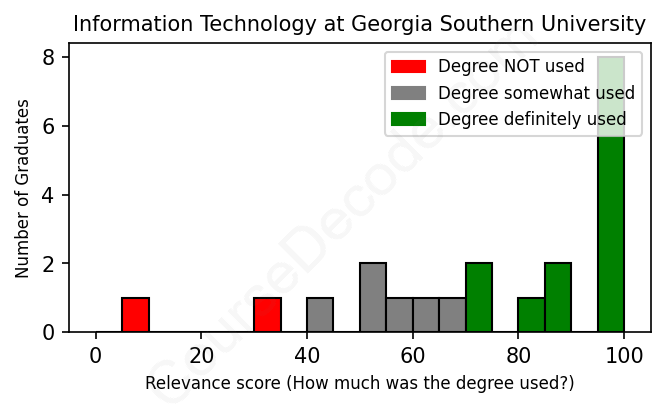
First, some facts. Of the Information Technology graduates from Georgia Southern University we've analyzed , here's how many have used (or NOT used) their degree in their career:

These are estimates based on AI analysis of 21 LinkedIn profiles (see below).
The verdict? Above average. Overall, with an average relevance score of 74%, Information Technology graduates from Georgia Southern University have a higher likelihood (+7%) of finding work in this field compared to the average graduate across all fields:
And for comparison, here's the chart for all profiles we've looked at across all degrees.
Also, after graduating, only 9% of these graduates have pursued further education other than another Bachelor's degree (such as a Masters degree or other), compared to the average across all profiles of 35%. This suggests a Bachelors degree is enough for most Information Technology graduates, and it's normal to look for work straight after graduation.
See the details:
|
Relevance score: 100% We think this person has gone into a career highly relevant to their degree. We think this person has gone into a career highly relevant to their degree.
DEGREE INFOGraduated in 2020 from Georgia Southern University with a Bachelor's degree in Information Technology. Also pursued further education since (see below). JOB HISTORY SINCE GRADUATIONIT Specialist U.S. Government Publishing Office Oct 2022 - Present FURTHER DEGREES DONE SINCE GRADUATINGMaster of Business Administration - MBAClayton State University 2020 - 2022 ABOUTInnovative software developer and system administrator technician who currently holds a masters degree in Digital Marketing, bachelors degree in Information Technology with an emphasis in network and cyber security, and a minor in Information Systems. |
The top 10 most common jobs done by the graduates we've analyzed (ranked most common to least) are:
When looking at the job profiles of graduates from Georgia Southern University's Information Technology program, it’s clear that a mix of relevant and somewhat relevant positions emerged. The most common roles directly connected to their IT education include Database Administrators, Network Analysts, Software Developers, and IT Specialists. These jobs typically demand a solid understanding of technology and practical skills that align well with the core curriculum of the Information Technology degree. For instance, roles like Network Administrator and Software Engineer stand out as they rely heavily on the technical expertise graduates acquired during their studies, demonstrating a clear application of their knowledge in real-world scenarios.
However, there are quite a few instances where the jobs graduates have landed seem to veer away from direct relevance to their degree. Positions in areas like customer service, retail management, and even as a grill operator don't fully capitalize on the IT training they received. Even some roles that incorporate IT tasks, such as Technical Support Lead or Field Technician, can sometimes focus more on customer relations or light technical duties rather than the deeper IT principles. Overall, while many professionals are successfully applying their IT skills in relevant positions, it’s also evident that not all paths taken align closely with the degree's core focus. It’s a mixed bag, showcasing both the versatile nature of the IT field and the varying success of graduates in finding roles that fully leverage their education.
Here is a visual representation of the most common words in job titles for Information Technology graduates (this is across all Information Technology graduates we've analyzed, not just those who went to Georgia Southern University):

Graduates from Georgia Southern University with a degree in Information Technology seem to have taken some pretty diverse paths in their careers, but many of them have landed jobs that are quite relevant to IT. For their first jobs, you can see a mix of roles, including positions like IT intern, technical support, and network analyst. It seems like many recent grads kick off their careers in entry-level IT roles, which is a solid start. Some even manage to get roles straight away that are more aligned with their degree, like web designers or network administrators. Over the first five years, many graduates continue to progress within the tech industry, developing skills and moving into specialist roles or managerial positions, which is a positive indicator of their career growth.
Fast forward 5 to 10 years later, and you'll notice that a lot of these alumni are still thriving in tech. Many have advanced to senior positions or specialized roles, such as software engineers, technical analysts, or IT supervisors. A few have even moved into project management and higher leadership roles. However, it's worth noting that not everyone has stayed strictly within IT; some have taken quite a few detours into unrelated fields like retail or hospitality for a while, before eventually finding their way back to tech. Overall, while there are a few exceptions, the majority of graduates appear to be finding successful careers in Information Technology, suggesting that Georgia Southern University's program equips them well for the job market. So, if you’re contemplating this path, there’s a good chance you’ll be set up for a career that's both fulfilling and relevant to your degree!
Honestly, a Bachelor’s degree in Information Technology at Georgia Southern University—or really anywhere—can be a mixed bag in terms of difficulty. It definitely has its challenging moments, especially with classes like programming, networking, and databases that can require a lot of focus and practice. But if you have some interest in tech and are willing to put in the effort, it’s totally manageable. A lot of students find a rhythm once they get used to the coursework and start applying what they learn through projects and hands-on experiences. Overall, it’s about average in terms of difficulty, but like with any degree, it really depends on your personal strengths and how hard you’re willing to work!
Most commonly, in the LinkedIn profiles we've looked at, it takes people 4 years to finish a Bachelor degree in Information Technology.
So, when you look at the job histories of these Georgia Southern grads, it seems like they’ve had a mixed bag in terms of making decent money. Many of the earlier graduates started in roles like database administration or IT positions, which typically pay better, but some of them later switched to jobs that don’t scream big bucks, like those in retail or food service, at least for a while. As you move to the more recent grads, a lot of them jumped into tech roles that are on the rise (like software development and network administration) and seem to be setting themselves up for better pay. Overall, it looks like if they stuck to IT roles, they’re probably doing okay, but some took a roundabout path that might not have paid as well initially.
Here is a visual representation of the most common words seen in the "about" section of LinkedIn profiles who have a Bachelor degree in Information Technology (this is across all Information Technology graduates we've analyzed, not just those who went to Georgia Southern University). This may or may not be useful:

Here are all colleges offering a Bachelor degree in Information Technology (ordered by the average relevance score of their Information Technology graduates, best to worst) where we have analyzed at least 10 of their graduates: